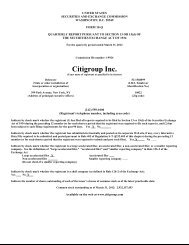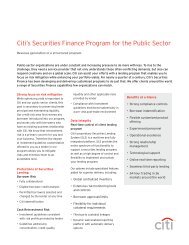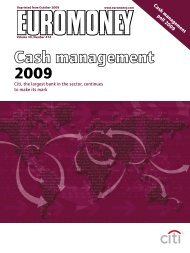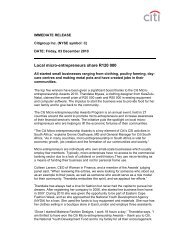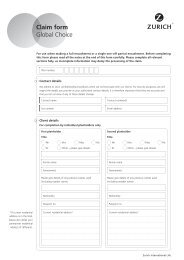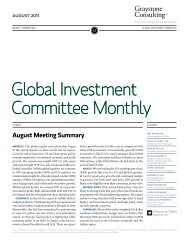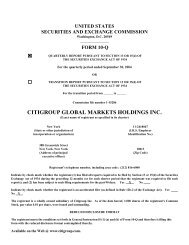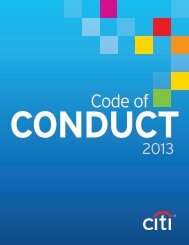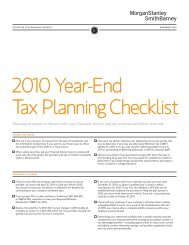The table below shows the fair value of investments in HTM that have been in an unrecognized loss position for less than 12 months or for 12 months or longeras of December 31, 2010 and December 31, 2009:In millions of dollarsDecember 31, 2010FairvalueLess than 12 months 12 months or longer TotalGrossunrecognizedlossesFairvalueGrossunrecognizedlossesFairvalueGrossunrecognizedlossesDebt securities held-to-maturityMortgage-backed securities $ 339 $ 30 $14,410 $ 387 $14,749 $ 417State and municipal 24 — 1,273 104 1,297 104Corporate 1,584 143 1,579 124 3,163 267Asset-backed securities 159 11 494 43 653 54Total debt securities held-to-maturity $ 2,106 $ 184 $17,756 $ 658 $19,862 $ 842December 31, 2009Debt securities held-to-maturityMortgage-backed securities $ — $ — $16,923 $ 690 $16,923 $ 690State and municipal 755 79 713 34 1,468 113Corporate — — 1,519 182 1,519 182Asset-backed securities 348 18 5,460 478 5,808 496Total debt securities held-to-maturity $ 1,103 $ 97 $24,615 $ 1,384 $25,718 $1,481Excluded from the gross unrecognized losses presented in the above tableare the $5.0 billion and $7.6 billion of gross unrealized losses recorded inAOCI mainly related to the HTM securities that were reclassified from AFSinvestments as of December 31, 2010 and December 31, 2009, respectively.Virtually all of these unrealized losses relate to securities that have beenin a loss position for 12 months or longer at both December 31, 2010 andDecember 31, 2009.The following table presents the carrying value and fair value of HTM debt securities by contractual maturity dates as of December 31, 2010 andDecember 31, 2009:December 31, 2010 December 31, 2009In millions of dollars Carrying value Fair value Carrying value Fair valueMortgage-backed securitiesDue within 1 year $ 21 $ 23 $ 1 $ 1After 1 but within 5 years 321 309 466 385After 5 but within 10 years 493 434 697 605After 10 years (1) 17,664 18,517 24,337 25,589Total $18,499 $19,283 $25,501 $26,580State and municipalDue within 1 year $ 12 $ 12 $ 6 $ 6After 1 but within 5 years 55 55 53 79After 5 but within 10 years 86 85 99 99After 10 years (1) 2,243 2,151 2,762 2,715Total $ 2,396 $ 2,303 $ 2,920 $ 2,899All other (2)Due within 1 year $ 351 $ 357 $ 4,652 $ 4,875After 1 but within 5 years 1,344 1,621 3,795 3,858After 5 but within 10 years 4,885 4,765 6,240 6,526After 10 years (1) 1,632 1,652 8,419 8,260Total $ 8,212 $ 8,395 $23,106 $23,519Total debt securities held-to-maturity $29,107 $29,981 $51,527 $52,998(1) Investments with no stated maturities are included as contractual maturities of greater than 10 years. Actual maturities may differ due to call or prepayment rights.(2) <strong>Inc</strong>ludes corporate and asset-backed securities.210
Evaluating Investments for Other-Than-TemporaryImpairmentsThe Company conducts and documents periodic reviews of all securitieswith unrealized losses to evaluate whether the impairment is other thantemporary. Prior to January 1, 2009, these reviews were conducted pursuantto FASB Staff Position No. FAS 115-1, The Meaning of Other-Than-Temporary Impairment and its Application to Certain Investments(now incorporated into ASC 320-10-35, Investments—Debt and EquitySecurities—Subsequent Measurement). Any unrealized loss identified asother than temporary was recorded directly in the Consolidated Statementof <strong>Inc</strong>ome. As of January 1, 2009, the Company adopted FSP FAS 115-2 andFAS 124-2 (now incorporated into ASC 320-10-35-34, Investments—Debtand Equity Securities: Recognition of an Other-Than-TemporaryImpairment). This guidance amends the impairment model for debtsecurities; the impairment model for equity securities was not affected.Under the guidance for debt securities, other-than-temporary impairment(OTTI) is recognized in earnings for debt securities that the Company has anintent to sell or that the Company believes it is more-likely-than-not that itwill be required to sell prior to recovery of the amortized cost basis. For thosesecurities that the Company does not intend to sell or expect to be required tosell, credit-related impairment is recognized in earnings, with the non-creditrelatedimpairment recorded in AOCI.An unrealized loss exists when the current fair value of an individualsecurity is less than its amortized cost basis. Unrealized losses that aredetermined to be temporary in nature are recorded, net of tax, in AOCI forAFS securities, while such losses related to HTM securities are not recorded,as these investments are carried at their amortized cost. For securitiestransferred to HTM from Trading account assets, amortized cost is definedas the fair value of the securities at the date of transfer, plus any accretionincome and less any impairment recognized in earnings subsequent totransfer. For securities transferred to HTM from AFS, amortized cost is definedas the original purchase cost, plus or minus any accretion or amortizationof a purchase discount or premium, less any impairment recognized inearnings subsequent to transfer.Regardless of the classification of the securities as AFS or HTM, theCompany has assessed each position for impairment.Factors considered in determining whether a loss is temporary include:• the length of time and the extent to which fair value has been below cost;• the severity of the impairment;• the cause of the impairment and the financial condition and near-termprospects of the issuer;• activity in the market of the issuer that may indicate adverse creditconditions; and• the Company’s ability and intent to hold the investment for a period oftime sufficient to allow for any anticipated recovery.The Company’s review for impairment generally entails:• identification and evaluation of investments that have indications ofpossible impairment;• analysis of individual investments that have fair values less thanamortized cost, including consideration of the length of time theinvestment has been in an unrealized loss position and the expectedrecovery period;• discussion of evidential matter, including an evaluation of factors ortriggers that could cause individual investments to qualify as havingother-than-temporary impairment and those that would not supportother-than-temporary impairment; and• documentation of the results of these analyses, as required under businesspolicies.For equity securities, management considers the various factors describedabove, including its intent and ability to hold the equity security for aperiod of time sufficient for recovery to cost. Where management lacks thatintent or ability, the security’s decline in fair value is deemed to be otherthan temporary and is recorded in earnings. AFS equity securities deemedother-than-temporarily impaired are written down to fair value, with the fulldifference between fair value and cost recognized in earnings.For debt securities that are not deemed to be credit impaired,management assesses whether it intends to sell or whether it is more-likelythan-notthat it would be required to sell the investment before the expectedrecovery of the amortized cost basis. In most cases, management has assertedthat it has no intent to sell and that it believes it is not likely to be required tosell the investment before recovery of its amortized cost basis. Where such anassertion has not been made, the security’s decline in fair value is deemed tobe other than temporary and is recorded in earnings.For debt securities, a critical component of the evaluation for OTTI isthe identification of credit impaired securities, where management does notexpect to receive cash flows sufficient to recover the entire amortized costbasis of the security. For securities purchased and classified as AFS with theexpectation of receiving full principal and interest cash flows as of the date ofpurchase, this analysis considers the likelihood of receiving all contractualprincipal and interest. For securities reclassified out of the trading category inthe fourth quarter of 2008, the analysis considers the likelihood of receivingthe expected principal and interest cash flows anticipated as of the date ofreclassification in the fourth quarter of 2008. The extent of the Company’sanalysis regarding credit quality and the stress on assumptions used in theanalysis have been refined for securities where the current fair value or othercharacteristics of the security warrant. The paragraphs below describe theCompany’s process for identifying credit impairment in security types withthe most significant unrealized losses as of December 31, 2010.211
- Page 1 and 2:
UNITED STATESSECURITIES AND EXCHANG
- Page 3 and 4:
CITIGROUP’S 2010 ANNUAL REPORT ON
- Page 5 and 6:
As described above, Citigroup is ma
- Page 7 and 8:
Operating ExpensesCitigroup operati
- Page 9 and 10:
FIVE-YEAR SUMMARY OF SELECTED FINAN
- Page 11 and 12:
CITIGROUP REVENUESIn millions of do
- Page 13 and 14:
REGIONAL CONSUMER BANKINGRegional C
- Page 15 and 16:
2009 vs. 2008Revenues, net of inter
- Page 17 and 18:
2009 vs. 2008Revenues, net of inter
- Page 19 and 20:
2009 vs. 2008Revenues, net of inter
- Page 21 and 22:
2009 vs. 2008Revenues, net of inter
- Page 23 and 24:
SECURITIES AND BANKINGSecurities an
- Page 25 and 26:
TRANSACTION SERVICESTransaction Ser
- Page 27 and 28:
BROKERAGE AND ASSET MANAGEMENTBroke
- Page 29 and 30:
Japan Consumer FinanceCitigroup con
- Page 31 and 32:
The following table provides detail
- Page 33 and 34:
CORPORATE/OTHERCorporate/Other incl
- Page 35 and 36:
During 2010, average Consumer loans
- Page 37 and 38:
SEGMENT BALANCE SHEET AT DECEMBER 3
- Page 39 and 40:
Citigroup Regulatory Capital Ratios
- Page 41 and 42:
Capital Resources of Citigroup’s
- Page 43 and 44:
Regulatory Capital Standards Develo
- Page 45 and 46:
DepositsCiti continues to focus on
- Page 47 and 48:
Secured financing is primarily cond
- Page 49 and 50:
Each of the credit rating agencies
- Page 51 and 52:
RISK FACTORSThe ongoing implementat
- Page 53 and 54:
The emerging markets in which Citi
- Page 55 and 56:
is largely uncertain. However, any
- Page 57 and 58:
a short-term Liquidity Coverage Rat
- Page 59 and 60:
understanding or cause confusion ac
- Page 61 and 62:
MANAGING GLOBAL RISKRISK MANAGEMENT
- Page 63 and 64:
CREDIT RISKCredit risk is the poten
- Page 65 and 66:
[This page intentionally left blank
- Page 67 and 68:
(1) 2010 primarily includes an addi
- Page 69 and 70:
Non-Accrual Loans and AssetsThe tab
- Page 71 and 72:
Renegotiated LoansThe following tab
- Page 73 and 74:
Citi’s first mortgage portfolio i
- Page 75 and 76:
Consumer Mortgage FICO and LTVData
- Page 77 and 78:
Second Mortgages: December 31, 2010
- Page 79 and 80:
Interest Rate Risk Associated with
- Page 81 and 82:
North America Cards—FICO Informat
- Page 83 and 84:
CONSUMER LOAN DETAILSConsumer Loan
- Page 85 and 86:
Consumer Loan Modification Programs
- Page 87 and 88:
North America CardsNorth America ca
- Page 89 and 90:
Payment deferrals that do not conti
- Page 91 and 92:
Repurchase ReserveCiti has recorded
- Page 93 and 94:
Securities and Banking-Sponsored Pr
- Page 95 and 96:
The following table presents the co
- Page 97 and 98:
MARKET RISKMarket risk encompasses
- Page 99 and 100:
Trading PortfoliosPrice risk in tra
- Page 101 and 102:
INTEREST REVENUE/EXPENSE AND YIELDS
- Page 103 and 104:
AVERAGE BALANCES AND INTEREST RATES
- Page 105 and 106:
ANALYSIS OF CHANGES IN INTEREST EXP
- Page 107 and 108:
[This page intentionally left blank
- Page 109 and 110:
As required by SEC rules, the table
- Page 111 and 112:
The credit valuation adjustment amo
- Page 113 and 114:
The fair values shown are prior to
- Page 115 and 116:
Key Controls over Fair Value Measur
- Page 117 and 118:
The following table reflects the in
- Page 119 and 120:
The results of the July 1, 2010 tes
- Page 121 and 122:
As a result of the losses incurred
- Page 123 and 124:
MANAGEMENT’S ANNUAL REPORT ON INT
- Page 125 and 126:
• an “ownership change” under
- Page 127 and 128:
REPORT OF INDEPENDENT REGISTERED PU
- Page 129 and 130:
FINANCIAL STATEMENTS AND NOTES TABL
- Page 131 and 132:
CONSOLIDATED FINANCIAL STATEMENTSCO
- Page 133 and 134:
CONSOLIDATED BALANCE SHEET(Continue
- Page 135 and 136:
CONSOLIDATED STATEMENT OF CHANGES I
- Page 137 and 138:
CITIBANK CONSOLIDATED BALANCE SHEET
- Page 139 and 140: NOTES TO CONSOLIDATED FINANCIAL STA
- Page 141 and 142: Repurchase and Resale AgreementsSec
- Page 143 and 144: ecoveries are added. Securities rec
- Page 145 and 146: Consumer Mortgage Representations a
- Page 147 and 148: Transfers of Financial AssetsFor a
- Page 149 and 150: ACCOUNTING CHANGESChange in Account
- Page 151 and 152: The following table reflects the in
- Page 153 and 154: Measuring Liabilities at Fair Value
- Page 155 and 156: Revisions to the Earnings-per-Share
- Page 157 and 158: FUTURE APPLICATION OF ACCOUNTING ST
- Page 159 and 160: 3. DISCONTINUED OPERATIONSSale of T
- Page 161 and 162: CitiCapitalOn July 31, 2008, Citigr
- Page 163 and 164: 5. INTEREST REVENUE AND EXPENSEFor
- Page 165 and 166: Stock Award ProgramsCitigroup issue
- Page 167 and 168: In January 2009, members of the Man
- Page 169 and 170: Information with respect to stock o
- Page 171 and 172: 9. RETIREMENT BENEFITSThe Company h
- Page 173 and 174: The following table shows the chang
- Page 175 and 176: A one-percentage-point change in th
- Page 177 and 178: Level 3 Roll ForwardThe reconciliat
- Page 179 and 180: 10. INCOME TAXESIn millions of doll
- Page 181 and 182: The Company is currently under audi
- Page 183 and 184: 11. EARNINGS PER SHAREThe following
- Page 185 and 186: 13. BROKERAGE RECEIVABLES AND BROKE
- Page 187 and 188: The table below shows the fair valu
- Page 189: Debt Securities Held-to-MaturityThe
- Page 193 and 194: The following is a 12-month roll-fo
- Page 195 and 196: 16. LOANSCitigroup loans are report
- Page 197 and 198: Residential Mortgage Loan to Values
- Page 199 and 200: The following table presents Corpor
- Page 201 and 202: Included in the Corporate and Consu
- Page 203 and 204: 18. GOODWILL AND INTANGIBLE ASSETSG
- Page 205 and 206: Intangible AssetsThe components of
- Page 207 and 208: CGMHI has committed long-term finan
- Page 209 and 210: 20. Regulatory CapitalCitigroup is
- Page 211 and 212: 22. SECURITIZATIONS AND VARIABLE IN
- Page 213 and 214: In millions of dollars As of Decemb
- Page 215 and 216: Funding Commitments for Significant
- Page 217 and 218: Credit Card SecuritizationsThe Comp
- Page 219 and 220: Managed Loans—Citi HoldingsThe fo
- Page 221 and 222: Key assumptions used in measuring t
- Page 223 and 224: Mortgage Servicing RightsIn connect
- Page 225 and 226: The Company administers one conduit
- Page 227 and 228: Key Assumptions and Retained Intere
- Page 229 and 230: Municipal InvestmentsMunicipal inve
- Page 231 and 232: Derivative NotionalsIn millions of
- Page 233 and 234: activities together with gains and
- Page 235 and 236: Cash Flow HedgesHedging of benchmar
- Page 237 and 238: The range of credit derivatives sol
- Page 239 and 240: 24. CONCENTRATIONS OF CREDIT RISKCo
- Page 241 and 242:
Trading account assets and liabilit
- Page 243 and 244:
The internal valuation techniques u
- Page 245 and 246:
In millions of dollars at December
- Page 247 and 248:
Changes in Level 3 Fair Value Categ
- Page 249 and 250:
In millions of dollarsDecember 31,2
- Page 251 and 252:
26. FAIR VALUE ELECTIONSThe Company
- Page 253 and 254:
The following table provides inform
- Page 255 and 256:
Certain structured liabilitiesThe C
- Page 257 and 258:
28. PLEDGED SECURITIES, COLLATERAL,
- Page 259 and 260:
The repurchase reserve estimation p
- Page 261 and 262:
CollateralCash collateral available
- Page 263 and 264:
29. CONTINGENCIESOverviewIn additio
- Page 265 and 266:
pursuant to which Citigroup agreed
- Page 267 and 268:
court filings under docket number 0
- Page 269 and 270:
30. CITIBANK, N.A. STOCKHOLDER’S
- Page 271 and 272:
Condensed Consolidating Statements
- Page 273 and 274:
Condensed Consolidating Statements
- Page 275 and 276:
Condensed Consolidating Balance She
- Page 277 and 278:
Condensed Consolidating Statements
- Page 279 and 280:
33. SELECTED QUARTERLY FINANCIAL DA
- Page 281 and 282:
SUPERVISION AND REGULATIONCitigroup
- Page 283 and 284:
Citigroup continues to evaluate its
- Page 285 and 286:
CORPORATE INFORMATIONCITIGROUP EXEC
- Page 287 and 288:
SignaturesPursuant to the requireme



